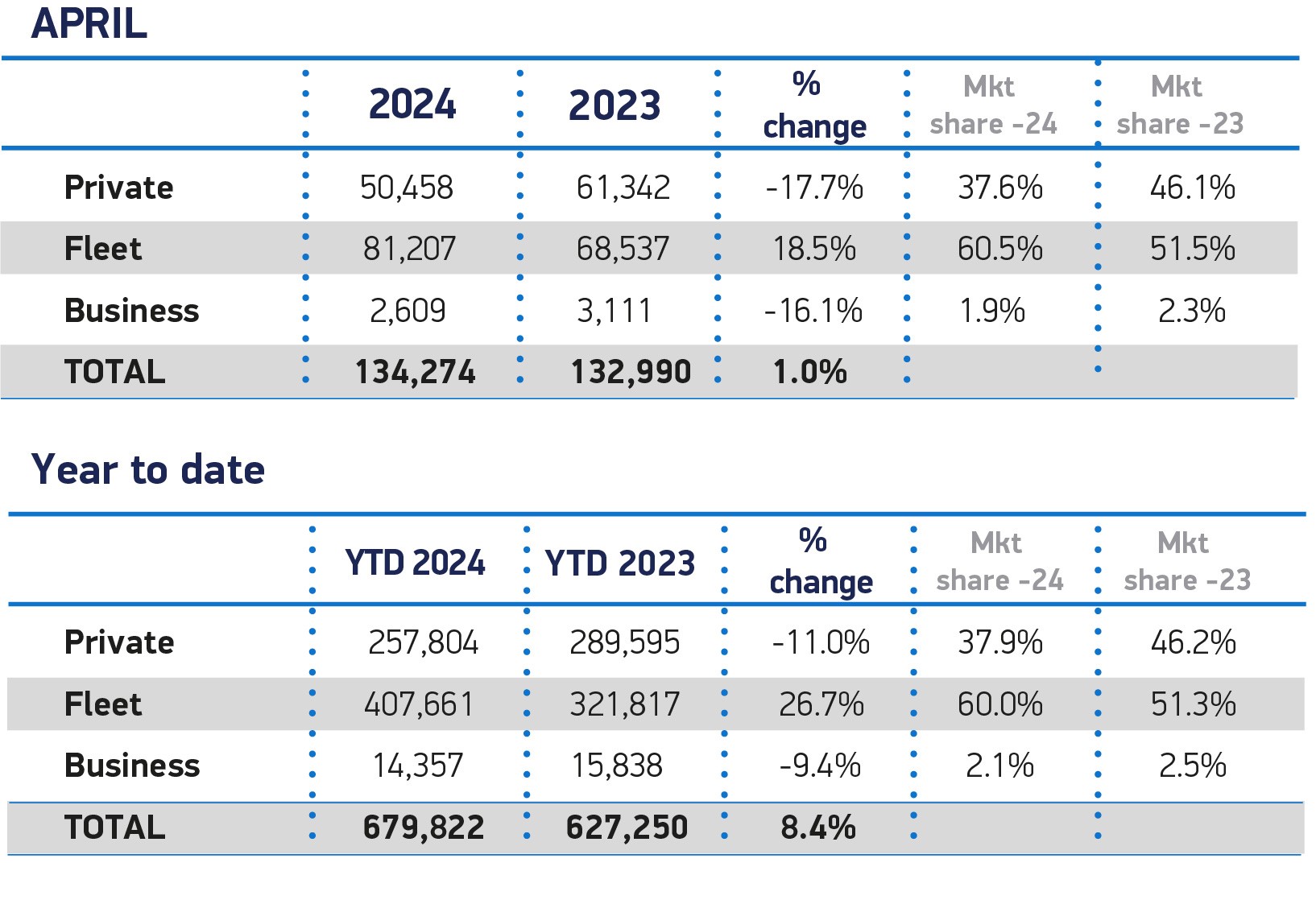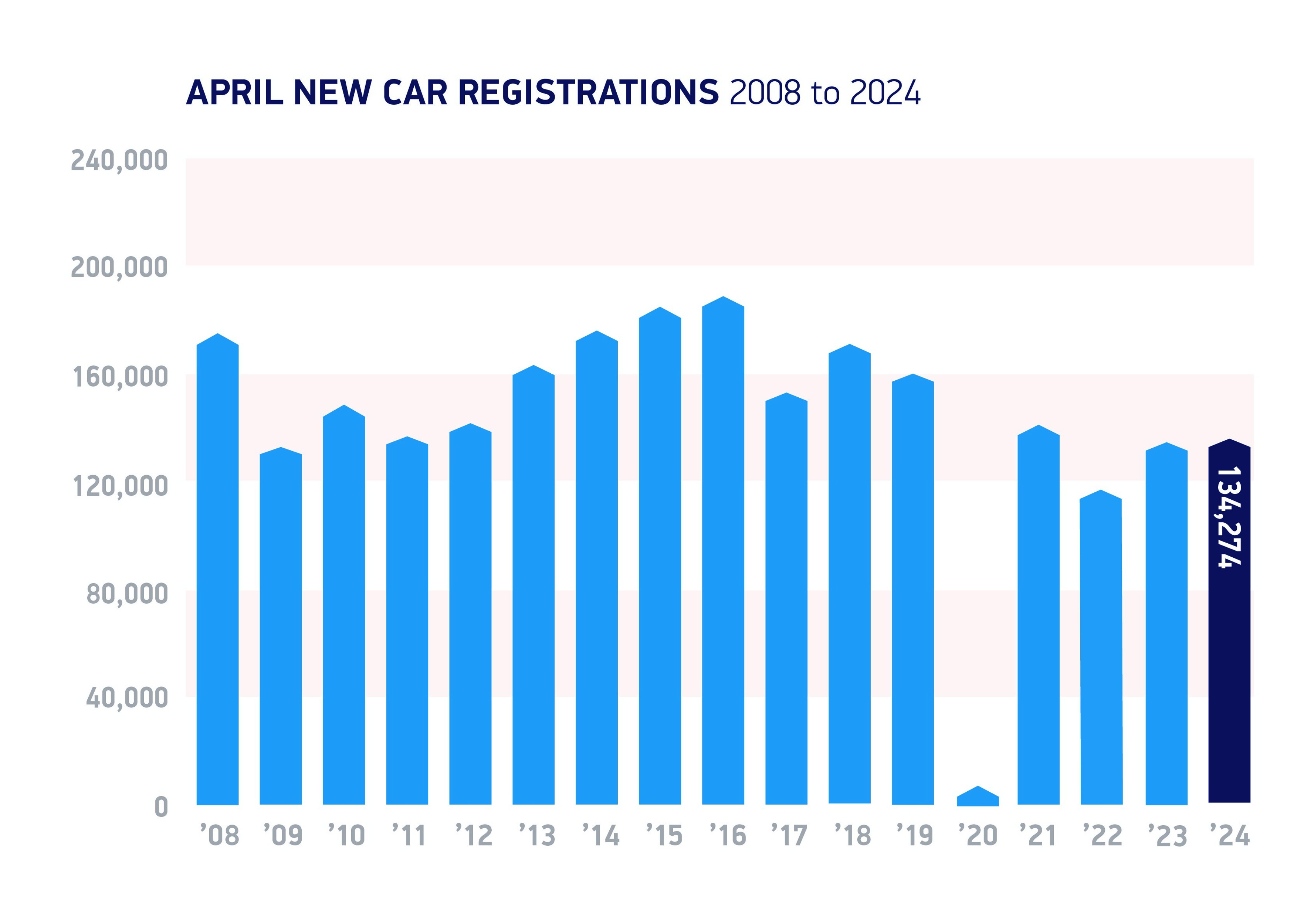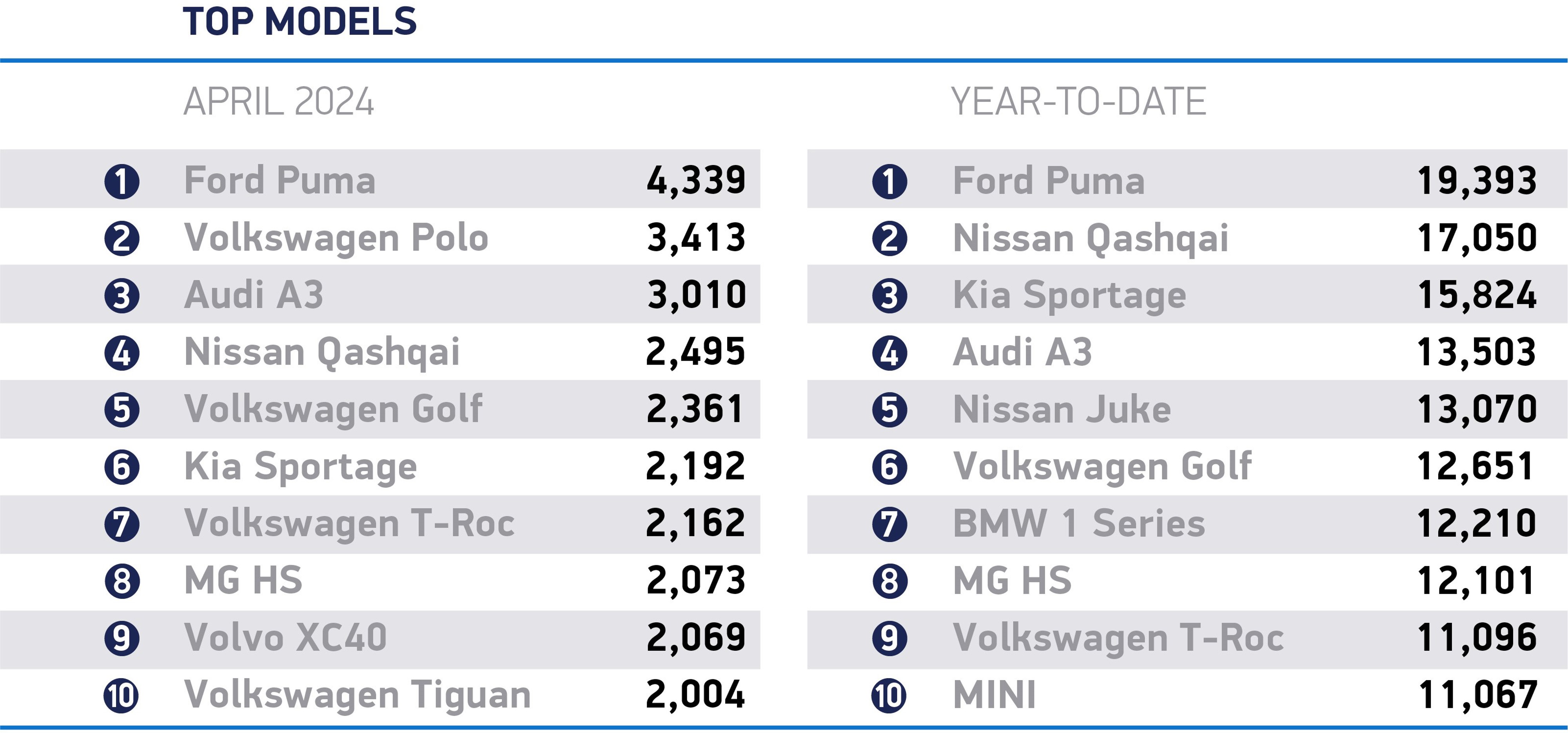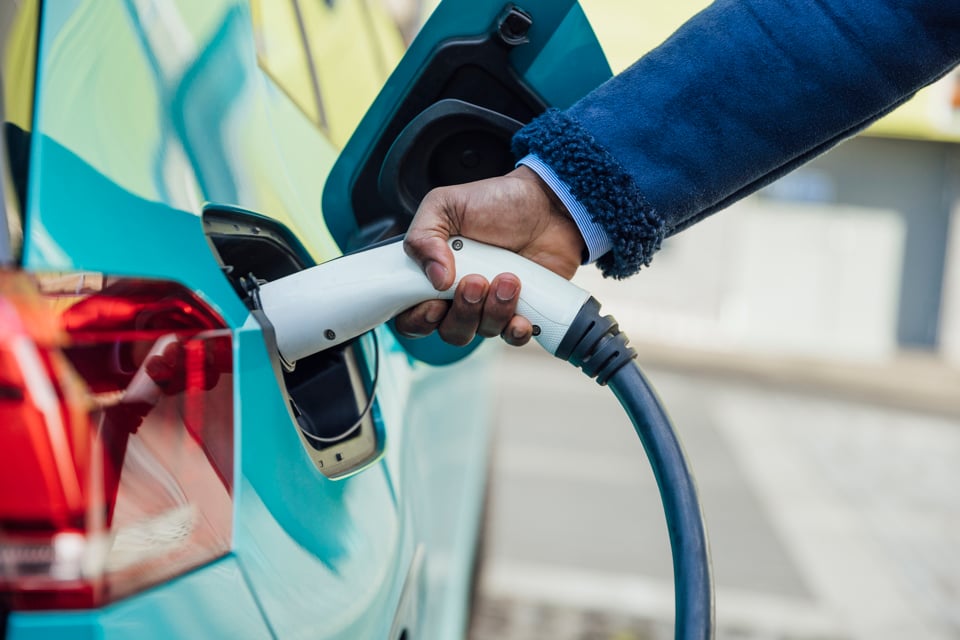Fleet and business registrations again dominated new car registrations in April, with 83,826 units registered in the month, according to according new data from the Society of Motor Manufacturers and Traders (SMMT).
That was a 16% uplift on the 71,648 company cars registered in April 2023, equating to a 62% market share, an eight-percentage point increase year-on-year.
Year-to-date, fleet and business registrations now stand at 422,018 units – 25% higher than the 337,655 registered in the first four months of 2023 – equating to a 62% market share.
Overall, UK new car registrations grew for the 21st consecutive month in April, rising by a modest 1% to reach 134,274 units.
As a result, this was the market’s best April since 2021, although uptake was still 16.6% below the pre-pandemic level in what is traditionally a low volume month following the March plate change.

Electrified vehicles continued to be the main drivers of market expansion. Plug-in hybrids (PHEVs) recorded the strongest growth, rising by 22.1% to account for 7.8% of the market, followed by hybrid electric vehicles (HEVs), up 16.7% with a 13.1% share of demand.
April was a brighter month for battery electric vehicle (BEV) registrations, with uptake increasing by 10.7%, pushing up market share to 16.9%, an uplift on last April’s 15.4%.

Fewer than one in six new BEVs bought in April went to consumers, whose uptake volumes fell by 21.9%.
Philip Nothard, insight director at Cox Automotive, said: “For many, confirmation of April’s year-to-date BEV share will come as something of a disappointment. At 15.7%, this is a mere 3% increase on the same period last year.
“The numbers should serve as a clarion call to this, or any new, Government — the challenges faced by the automotive sector deserve greater focus, not just legislation.
“If manufacturers are to remain committed to the UK long term, the government must stimulate demand. OEMs are clearly invested in the shift to electrification, but the zero emission vehicle mandate doesn’t address the more pressing issue of public confidence in EVs.”
The SMMT says that the lack of Government incentives for private motorists remains a barrier that cannot be overcome by industry alone.
Given tax incentives are proven to deliver a rapid shift to BEVs in the fleet market, providing private buyers with a similar level of support would accelerate an overall market shift, fuel economic growth and deliver a sustainable, fair transition, it added.
Temporarily halving VAT on new BEV purchases would help more than a quarter of a million drivers to switch from fossil fuel to electric over the next three years.
Similarly, altering the threshold for the ‘expensive car’ supplement to Vehicle Excise Duty – due to apply to EVs from April 2025 – would send the message to the market that zero emission vehicles are necessities, not luxuries, according to the SMMT.
The latest market outlook shows a diminishing share for BEVs despite a growing overall new car market. SMMT now anticipates that 1.984 million new cars will be registered in 2024 – a 4.2% rise on last year, and a 0.5% increase on January’s outlook.
However, BEV volumes for this year have been revised downwards by 5.2%, with anticipated market share now 19.8%, significantly below the Government target of 22% per manufacturer under the ZEV mandate.
Mike Hawes, SMMT chief executive, said: “The new car market continues to grow even in the quieter months, driven primarily by fleet demand.
“This is particularly true of the electric vehicle sector, where the absence of Government incentives for private buyers is having a marked effect.
“Although attractive deals on EVs are in place, manufacturers cannot fund the mass market transition single-handedly.
“Temporarily cutting VAT, treating EVs as fiscally mainstream not luxury vehicles, and taking steps to instil consumer confidence in the charge point network will drive the market growth on which Britain’s net zero ambition depends.”

Last month, the Government ruled out any changes to VAT rules for EV charging and refused to introduce new incentives for the plug-in retail car market.
Nick Williams, managing director of Lex Autolease, part of Lloyds Banking Group, said: “Despite the economic environment, it’s encouraging to see electric vehicle sales continue to move in the right direction.
“That said, the overall production landscape looks set to be challenging this year and there is a requirement for everyone involved in the electric vehicle transition to help sustain consumer confidence. From affordability to charging, we know that people have concerns, so it’s no surprise to hear some question the industry’s ability to meet its zero emission vehicle targets.
“What’s needed now is certainty from Government, especially about the essential incentives needed to encourage drivers to make the switch. Prioritising the rapid and fair roll out of charging infrastructure is vital too, as well as a clear communication strategy to provide authoritative, clear and trustworthy information on EVs.
“We recognise that the transition to a more sustainable future of transport to benefit us all is not easy.”
Kim Royds, mobility director at Centrica, says that to balance supply and demand, more work is needed to help drivers overcome the barriers to making the switch.
“Top of the list must be tackling the inequality between domestic and public charging infrastructure. If more people have access to a charge point, whether they have a driveway or not, it stands to reason that EVs will become more attractive to a greater portion of the population,” she added.
“Without doubt, continued collaboration and knowledge-sharing between vehicle manufacturers and energy providers is needed to provide charging solutions that are both affordable and accessible.”
While some consumer car purchases are covered under fleet data in the shape of salary sacrifice leasing, consumer new car sales are continuing to be impacted by pressure on household budgets, and a higher cost of finance and insurance, according to Richard Peberdy, UK head of automotive at KPMG.
“New car sellers are discounting to try and create more consumer growth, whilst also pushing new models coming to market,” he said.
“The UK car industry is hoping that interest rate falls in the second half of the year may bring about improved consumer confidence in the short to medium term picture for the UK economy.
“The implications of the zero emission mandate will also be an increasing concern as the year goes on, should electric vehicle market share not increase.”
Jon Lawes, managing director at Novuna Vehicle Solutions, added: “Commitments to company car BIK rates and battery health standards are welcome, but policymakers have shied away from the fundamental issue of boosting consumer accessibility.
“This was a chance to get the EV transition back on track with a package of measures, but purchase grants, a VAT cut on public charging and support for the second-hand market were all ruled out.”
Chris Leslie, commercial director at MAF Finance Group, is also concerned how this month’s numbers continue to show a fall in private demand for BEVs, with less than one in six new fully electric cars bought in April going to retail buyers.
“While it can make sense for businesses to turn to BEVs, there are simply not the same level of incentives out there to convince the consumer to take the plunge, despite a growing array of vehicles,” said Leslie.
“So, it is of no real surprise that forecasts for volumes in 2024 have now been revised downwards. If we are going to see sustainable growth in this trend amongst private buyers, we must see decisive action.
“Beyond making sure the right charging infrastructure is built across the country, we must consider some financial measures, including a reduction in VAT on new electric cars and a revamp of the Vehicle Excise Duty.
“These measures could also play a big part in enticing consumers to make more eco-friendly choices. If the government is more pro-active in this respect, then the overall positive trajectory for sector should be maintained.”






















Login to comment
Comments
No comments have been made yet.